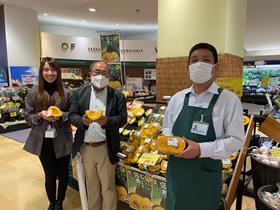
In a first for the Australian state of Queensland, Darling Downs growers have made a significant breakthrough, producing a crop of export-standard squash (Kabocha) that has been sent to Japan where it is a dietary staple.
Queensland minister for agriculture industry development and fisheries, Mark Furner, said the export success was welcome for jobs as Queensland unites and recovers from the impact of the Covid-19 pandemic.
“Like the rest of the world, Queensland has been hit hard by the global pandemic, but our agricultural sector has been one of the shining lights,” said Furner.
“The health response is ongoing, and we are starting to deliver Queensland’s plan to ‘Unite and Recover’ for Queensland Jobs.
“New export opportunities like this one can only be good for jobs and the long-term growth of our agricultural sector,” he added.
The export success, led by two growers in Darling Downs, has the potential to open the door to a A$108m export market into Japan. It will enable Australia to compete with Mexico and New Zealand, which currently have the lion’s share of the Japanese Kabocha market.
Furner said the first shipment had arrived in Japan, in a deal that was years in the making.
“The kabocha squash looks like a pumpkin but, unlike many pumpkin varieties, it is perfect for microwave ready meals because it maintains structure, taste and firmness when cooked,” he explained.
“Through the Department of Agriculture and Fisheries (DAF) Growing Queensland’s Food Exports (GQFE) programme, Qualipac has partnered with growers, the importer, Trade and Investment Queensland (TIQ), and the University of Queensland (UQ) to make this shipment happen.”
Furner indicated the GQFE project teams would visit New Zealand and Mexico to gain greater understanding of production and supply chain efficiencies to enhance export opportunities once Covid-19 travel restrictions are eased.
Kees Versteeg, Qualipac’s sales, marketing and business development manager, said this first shipment was a significant breakthrough for all involved.
“We had had to learn how to grow Kabocha, when to harvest it, and invest in new export packaging to meet the rigorous specifications of the Japanese market,” explained Versteeg.
“It has been a steep learning curve for everyone. We have been very fortunate to have the Japanese importer working with us and giving advice every step of the way, including support from their existing suppliers.
“This project serves as a great example of a strategic approach to exporting with government and industry working together in partnership to open up new markets and new product opportunities.”
General manager vegetables at Wismettac, Fumiya, has been working with the GQFE team. He said he was pleasantly surprised by the overall quality of the shipment.
“The Queensland kabocha has very good sugar levels, and this is important to the Japanese consumer as they like kabocha to be sweet tasting”, noted Fumiya.
“Our company is very impressed with how the Queensland government has worked together with us and the growers on this new enterprise.
Fumiya added there are plans to do another trial later this year, with the goal of adding Queensland’s supply window into its existing supply.



